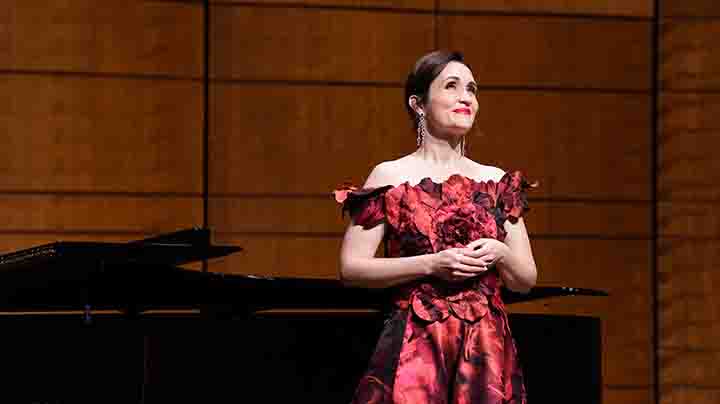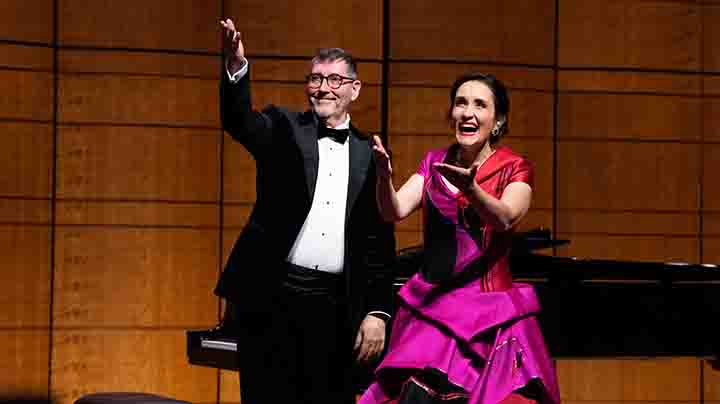A steady fixture at the Met over the past decade and a half, her recital coincided with and featured selections from her first solo recital disc, “Rose In Bloom,” also with Moore.
The wide-ranging program featured selections in five languages and far-flung styles and periods, loosely linked by imagery of flowers and nature. Yet this felt like something more holistic than the typical recital grab bag, Morley offering an unusually unified sonic and artistic vision for these songs. Her high lying lyric soprano retains a distinctive and consistent color across her focused range, with dignified, cool-hued shades punctuated by flashes of blinding white in her upper extension.
The color and altitude of the voice give an impression of clarity and delicacy that can lull one into thinking this is a modestly sized instrument, but that would be a mistake, as she easily summons the same power she uses to reach the back of the Family Circle when needed. The refined vocal presentation is enhanced by an elegant bearing and economy of gesture on the recital stage, channeling the same self-assured presence and stillness that draws one’s eye to her characters in the opera house.
The evening opened with the first complete performance of Huit Chansons de Fleur, a song cycle by Ricky Ian Gordon which anchors the new album, featuring emotionally precise settings of poems from Gordon, Emily Dickinson, Dorothy Parker, and others. Gordon’s skill with vocal writing, honed across his prolific career in opera and musical theater, was immediately evident here in the organic flow of the word setting and ability to engage the listener in the text. The score’s gently ambivalent harmonic language elaborated on the concealed and conflicted emotions in the selected poems, while Moore’s insightful and reserved handling of the piano writing enveloped the vocal line with transparent textures.
Morley’s performance eschewed extremes, prioritizing subdued vocal effects and subtle changes in the weight of her sound to realize the score’s incremental turns from light to dark. The flower motifs in these poems, triggering memories or representing beautiful but distant and unattainable objects, found urgent expression in Morley’s palette of austere colors, while her careful engagement with the text added depth and movement to Gordon’s finely wrought vocal lines. Just a few of the highlights included “I Wandered Lonely as a Cloud,” on poetry of Wordsworth, the wistful “Her Garden” on a text by Donald Hall, and “The Tulips” set to Gordon’s own text.
The following set of French songs offered a glimpse of the technical prowess that has been a mainstay of Morley’s career, from liquid trills in Bizet’s “Ouvre ton coeur” to ecstatic high notes (a final high note generating audible commotion in the audience) in Saint-Saens’s showpiece “La Libellule” and a virtuoso tour of different bird sounds in the same composer’s wordless “Le Rossignol et la rose.” After the relative warmth of the Gordon songs, Morley’s voice assumed a steelier edge here, a gleaming scalpel to meet the precision demands of these selections.
Two Russian selections prompted an earthier turn in her sound, employed in a limpid “Lilacs” from Rachmaninov’s Op. 21 Romances, and a deeply felt rendition of Rimsky-Korsakov’s “The Rose Enslaves the Nightingale” (Morley as Fevronia in Invisible City of Kitezh when?).
Richard Strauss’s “Ich wollt’ ein Sträußlein Binden” was a bit of an inert opening to the German set, but the follow up was a glowing take on Robert Schumann’s “Der Nussbaum,” with its familiar piano theme sensitively interjected by Moore. Zemlinsky’s “Voglein Schwermut” (one of the occasional detours from flowers to birds) was darkly foreboding, while Morley affected a heavier vocal weight for the hothouse late romanticism of Berg’s “Der Nachtigall.”
The final set featured a series of encores favored by 19th and early 20th century progenitors of Morley’s fach, with Moore adding some delightful trivia about the warring divas of the “nightingale” genre from the piano. But Morley approached this lighter fare with the same detail and intensity that characterized the rest of the program. “Last Rose of Summer,” a Jenny Lind signature that could easily take a turn for the maudlin, was stately and disarmingly earnest, Morley affecting just a hint of stiffness in the spirit of the song’s arch romantic milieu.
The bravura capstone, “Neath my Lattice” from Arthur Sullivan’s 1899 light opera The Rose of Persia was a vehicle for Ellen Beach Yaw, nicknamed the “California Nightingale,” and was presented here in Yaw’s original key. If this began as a delightfully ridiculous relic, any chuckles were thoroughly silenced by ascending runs reaching up to a series of hypersonic G flats. A single encore, Ivor Novello’s “We’ll Gather Lilacs in the Spring,” the big hit from the 1945 musical Perchance to Dream, echoed Morley’s wistful affect from “Last of Rose of Summer,” closing with a delicate floated pianissimo that nicely summed up the graceful and superbly executed music-making that characterized the evening.
Photos: Vocal Arts DC




